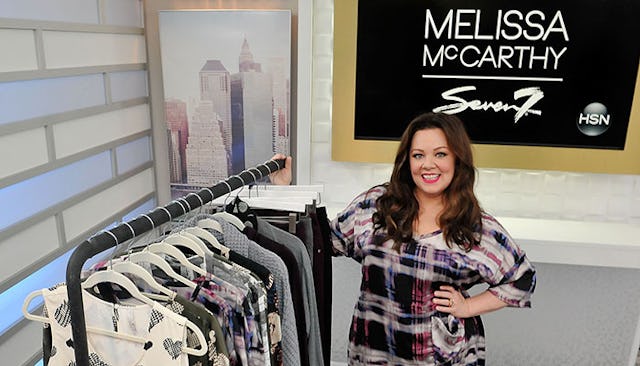Melissa McCarthy Launches New Clothing Line, Loses The Term 'Plus-Size'

Women have to navigate a confusing morass of euphemisms just to acquire a blouse and a skirt—I once wandered around a department store wondering what the difference was between the “ladies” department and the “women’s” section. There seemed to be some kind of statement about size that I just wasn’t getting. I also wondered, as McCarthy did earlier this year, why all of the clothes for women couldn’t be placed together, with garments in every size on the same racks. She told More, “It’s an odd thing that you can’t go shopping with your friends, because your store is upstairs hidden by the tire section […] We’ll put you gals over there because we don’t want to see you and you probably don’t want to be seen.”
McCarthy’s new clothing line, Melissa McCarthy Seven7, launches this month and will feature clothes from sizes 4 to 28. It will be offered at Bloomingdales, Nordstrom and Macy’s, among others. She notes that at least a couple of them—though she’s not willing to say which ones yet—have agreed to stop segregating the sizes.
Totally aside from the plus-size bandwagon, McCarthy has been vocal about how women larger than a size 12 simply don’t have a lot to choose from, fashion-wise. Even as early as Gilmore Girls, she was altering her costumes to be more flattering and fun, and she reports that other women have also been frustrated that fashionable clothes seem to be restricted to thin women. She told Refinery29: “I would have things made, and when I would wear them, I can’t tell you how many times I would have another woman say, ‘Oh my god, where did you get that?’ And I frankly felt guilty saying, ‘Oh, I made it for a show and I begged them for it because I loved it so much.’” She said she wasn’t able to find clothes for women her size without resorting to looking like either a 14-year-old hooker or a grandmother—and that’s what her new line aims to correct.
Regardless of the actual fashion, she’s probably onto something, business-wise, by ending the segregation of the “plus-sized.” If women can shop with their friends rather than being shunted to the tire section, they’re more likely to make impulse purchases. And that’ll be good for her bottom line.
This article was originally published on